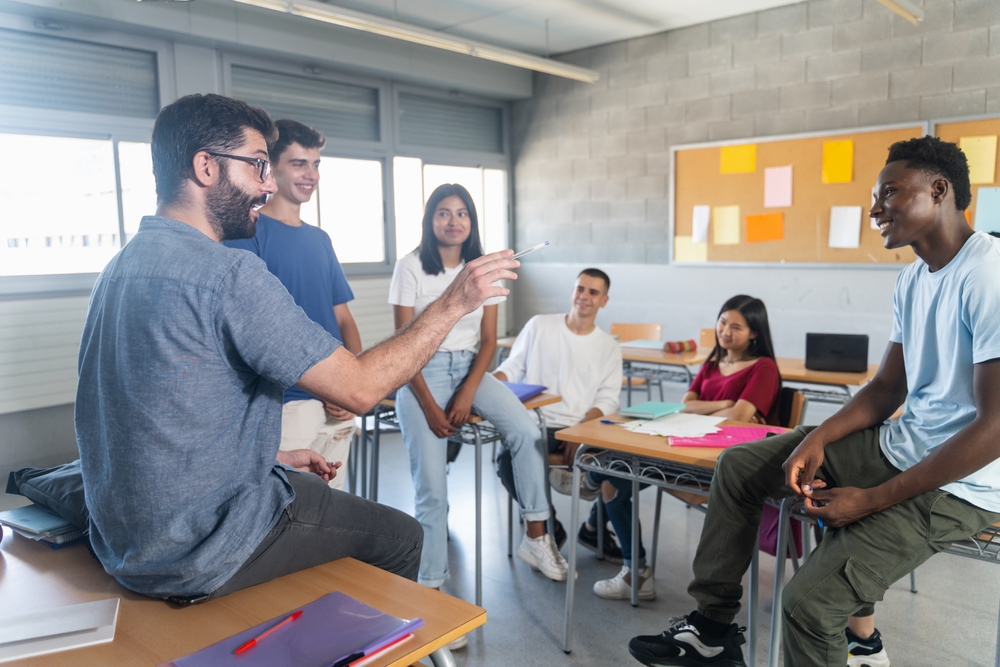For many underprivileged youth, the prospect of graduating from high school and going to college feels impossible. For generations, they have seen experienced limited opportunities for successopportunitieslittle success, and they feel as though they are destined for the same path lifestylfe as their parents or grandparents. Mentorship is an effective way to bridge that gap, change those negative mindsets, and give students the skills they need to achieve success, both in and out of the classroom.
What is the Purpose of Mentoring?
Mentoring programs bring positive role models toalongside these at-risk youth to help them make the most out of their education, improve their mindset, and set themselves up for success. Mentoring goes beyond simple tutoring or counseling. Rather, mentoring allows the mentor to build a relationship with the student that lasts throughout their high school years and beyond, helping them thrive in ensuring their academic, social, and physical life needs are met well.
Why is Mentorship Important for Students?
Mentorship programs for youth build long-term, supportive relationships that can break negative cycles and inspire students to pursue brighter futures. A mentor provides more than just encouragement—they model a pathway to success, showing students that they have the power to shape a positive future for themselves and their communities.
Mentors play an essential role in shaping the next generation of community members and leaders. Through shared activities, open discussions, and guidance, mentors demonstrate what a different path can look like, offering students a vision of possibility and purpose. They help students see that they can overcome obstacles, set goals, and make choices that lead to fulfillment and stability.
With a mentor, students have someone who genuinely cares, checks in on their progress, and helps them stay on track, creating a powerful support system that goes beyond academics. These relationships foster resilience, build character, and prepare students to contribute meaningfully to their communities. When we invest in mentorship, we’re investing in a generation of future citizens equipped to lead and make a lasting impact.
Key Benefits of Mentoring for Students
A mentor is someone who will get to know a student’s strengths and weaknesses, and then provide the right support they need to ensure they complete their education and attain their future goals. The stability and support that comes from a mentor provides several key benefits for students:
Emotional and Social Development
Mentors challenge the negative assumptions that youth have about themselves and their abilities. They will teach them emotional strategies to use to deal with the ups and downs of their teenage years. According to the Department of Education’s National Center on Safe and Supportive Learning Environments, this helps students learn to problem-solve, regulate emotions, and see a positive future for themselves.
Building Life Skills and Character
When they have better emotional regulation and a trusted adult who spends time with them, young people are able to build important life skills and develop positive character traits. For example, in one study of the Big Brothers Big Sisters program, published on Mentoring.org, 46% of students surveyed who had a mentor were less likely than their peers to start using drugs. Youth with a mentor are 92% more likely to volunteer and 75% more likely to have a leadership position in a club or on a team.
Personal Growth and Resilience
Resilience is a key not only in education success but also in future life and career success. Resilience must be taught, and mentors do so by helping students embrace personal growth and maintain a hopeful, opportunity-focused outlook. They also teach their students how to push through adversity, adapt to solve problems, and grow through them. Statistics show that this growth and resilience works in promoting future success. For example, in a recent Gallup survey of NCAA athletes, 27% said they had a mentor who encouraged them to pursue their goals and dreams.
Career Guidance
At-risk youth often need a little help to consider their career options. Many have negative ideas about their abilities and the opportunities afforded them. Mentors can help break them free of this negative thinking, guiding them to a career path that fits their passions and skills.
Enhanced Academic Experience and Outcomes
Mentorship has a direct positive impact on both the academic experience and the academic outcomes for students. In one study, students with mentors saw a 2% to 20% increase in their GPAs, as well week as a 22% to 35% drop in the number of classes the students failed. Students with mentors also see an increase in the number of extracurriculars they participate in and build better relationships with both teachers and peers. They also have a much lower drop-out and higher graduation rate than their peers.
Long-Term Impact
Mentors often create lifelong relationships with their students, and they become role models the students can emulate throughout life. Investing in mentorship reaps long-term benefits. For instance, college graduates who had mentors are 2.2 times more likely to be engaged in their future career than those who did not, according to the Great Jobs, Great Lives Report.
The Role of Students and Mentors in Education
On the surface, the role of mentors in a students’ education is one of supporting their academic achievement, but it goes much further than this. Guidance from a mentor influences a students’ character and personal growth. When they have a trusted adult in their corner cheering them on, students will push through the challenges they face and toward success.
The Challenges Faced by Underprivileged Students
While every student can benefit from mentorship, young people facing significant social and economic obstacles—particularly in urban settings—often have the greatest need for support. At-risk youth contend with complex challenges that can include mental health struggles, economic insecurity, and negative social pressures. For some, these barriers contribute to high dropout rates, increased vulnerability to substance abuse, and heightened risks of gang involvement or incarceration. These factors, combined with the limited capacity of under-resourced public schools, can lead to young people falling through the cracks.
Recent data from the U.S. Bureau of Labor Statistics highlights the urgent need for support: the labor force participation rate for recent high school dropouts is only 43.7%, significantly lower than the 71.7% participation rate for recent high school graduates not enrolled in college. This translates into a stark reality for young adults who lack a diploma, increasing their risk of long-term economic hardship and unemployment.
Supporting Educational Success for Youth in Need
While these facts paint a dire picture, urban students desire and can achieve success. They just need the right support. Youth facing these challenges need positive, caring adults to come alongside and help them navigate these challenges with guidance and support. They cannot do it alone, and statistics have shown that mentorship is a key factor in overcoming these challenges to find success.
Elevate New England’s Mentorship Program
The need for mentors for underprivileged youth is high, and in Lowell and Lawrence, Elevate New England is taking on the task. Through teacher-mentors who directly address the challenges at-risk youth face, Elevate New England is breaking the cycle and ensuring every young person, regardless of their background, is equipped to find success. Through building caring relationships with students, teacher-mentors offer more than just mentorship; they provide essential college and career guidance, encourage students to participate in extracurricular activities, and regularly connect with instructors to keep students on track academically.
Our mentorship program is unique because it begins in the classroom. Through engaging activities, accredited classes, and shared learning experiences, we build a strong foundation with each student—reaching young people who might not otherwise seek out or have access to mentorship. Starting in the classroom allows us to create bonds that go beyond traditional mentoring, meeting each student’s needs and fostering trust.
Our program offers:
- Social-emotional learning
- Character and life skills education
- Leadership development
- Community service
- Outdoor adventure
- Regular academic check-ins
- Tutoring
- Graduation support
- College and trade school visits
- Workforce guidance
- College and job application support
- And so much more!
Why is mentorship important for students? Because it works. Students who participate in Elevate New England’s mentorship program demonstrate active engagement in their communities and an advanced understanding of their personal character and growth, and 98% of Elevate students are on track to be high school graduates.
Student Mentoring in Education: Gina’s Success Story
Gina’s journey is a powerful example of how Elevate New England’s mentorship transforms lives. Her early school years were marked by defiance and aggression, largely shaped by challenging circumstances at home. Her disruptive behavior kept her isolated, and she had a hard time trusting anyone.
Everything changed when Gina joined Elevate New England’s Teach Back program, though she was initially resistant. Thanks to the persistence of her teacher-mentors, Adam and Kendra, she eventually participated. The turning point came when she stood in front of third graders during a Teach Back session. As she saw their eager, trusting faces, something shifted in her. The experience softened her tough exterior, and she transformed from a reluctant participant into “Miss Gina”—a mentor and role model to younger students.
This profound change wasn’t just about that single moment. Elevate New England’s consistent guidance, care, and life skills training helped Gina overcome her personal challenges. She now embraces leadership and personal growth, and her story is a testament to the life-changing power of mentorship.
Stand With Us to Help More Students Like Gina
Mentorship is key to unlocking the potential in students like Gina. Through Elevate New England’s teacher-mentors, young people receive the support they need to succeed—both in school and in life. But we cannot do it alone. Partner with us to stand in the gap for these students, and together, we can empower the next generation of thriving leaders.
Contact Elevate New England to learn more about our programs or to contribute. You can also partner with us to help these students. Remember, no one gets here alone, and we need your support to provide the guidance, support, and opportunities these students need to thrive.

